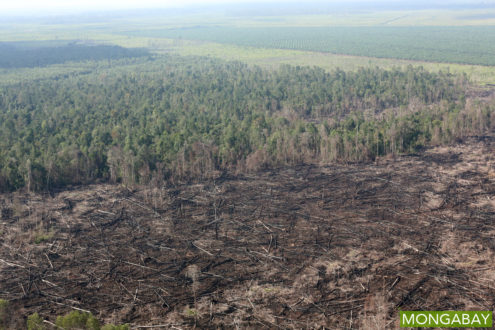Land grabbing and environmental destruction could now be prosecuted under international law
The International Criminal Court (ICC), housed at The Hague in the Netherlands, has mostly focused on human rights abuses and war crimes committed during armed conflicts throughout its 14-year history. But the court has now signaled that it will begin investigating crimes such as land grabbing, environmental destruction, and forced evictions that are often committed during peacetime in the pursuit of profit.
In a detailed policy paper on case selection and prioritization released last week, ICC Prosecutor Fatou Bensouda wrote that “crimes that are committed by means of, or that result in, inter alia, the destruction of the environment, the illegal exploitation of natural resources or the illegal dispossession of land” will be given “particular consideration” for prosecution.
The significant change to ICC’s strategy comes as Bensouda is poised to deliver a decision on whether or not to investigate a case filed in 2014 by international human rights lawyer Richard Rogers of the law firm Global Diligence LLP, which alleges a number of human rights violations were committed during a series of land seizures in Cambodia thatforced hundreds of thousands of people from their homes.
“The systemic crimes committed under the guise of ‘development’ are no less damaging to victims than many wartime atrocities,” Rogers said in a statement. “Forced population displacement destroys entire communities and leads to instability or even war. The ICC Prosecutor has sent a clear message that such offences may amount to crimes against humanity and can no longer be tolerated.”
The Cambodia case will be a key test for the ICC’s new policy, according to Global Witness, a London- and Washington, D.C.-based NGO. “If accepted, this would be the first case in international criminal law where the primary allegations relate to the illegal exploitation of land. Corporate actors in Cambodia could be the prime targets for investigation.”
Many local and traditional communities across Africa, Asia, and Latin America lack legal rights to the land they live on, even when they’ve lived there for several generations. Meanwhile, in many key consumer countries, including the United States and several EU nations, importers and investors are not legally bound to ensure that commodities like gold, palm oil, or timber were legally or ethically produced in the source country.
But expanding the court’s focus to include environmental crimes “could reshape how business is done in developing countries,” Global Witness said, as company executives, politicians, and any other individuals complicit in such crimes could be held criminally responsible under international law.
At least 38.9 million hectares (about 96.1 million acres) of land in developing countries — an area the size of Germany — has been leased to investors since 2000, the group notes. This has led to millions of people being evicted from their land illegally and, often, violently.
Global Witness data shows that more than three people were murdered every week in 2015 while defending their land from theft and environmentally destructive industries, making it the deadliest year on record for environmental activists. Conflicts precipitated by mining projects were the number one cause of these killings, the group found, followed by agribusiness, hydroelectric dams, and logging.
“Chasing communities off their land and trashing the environment has become an accepted way of doing business in many resource-rich yet cash-poor countries,” Gillian Caldwell, Executive Director at Global Witness, said in a statement.
“[Last week’s] decision by the ICC shows that the age of impunity is coming to an end. Company bosses and politicians complicit in violently seizing land, razing tropical forests or poisoning water sources could soon find themselves standing trial in the Hague alongside war criminals and dictators. The ICC’s interest could help improve the lives of millions of people and protect critical ecosystems.”

No comments:
Post a Comment